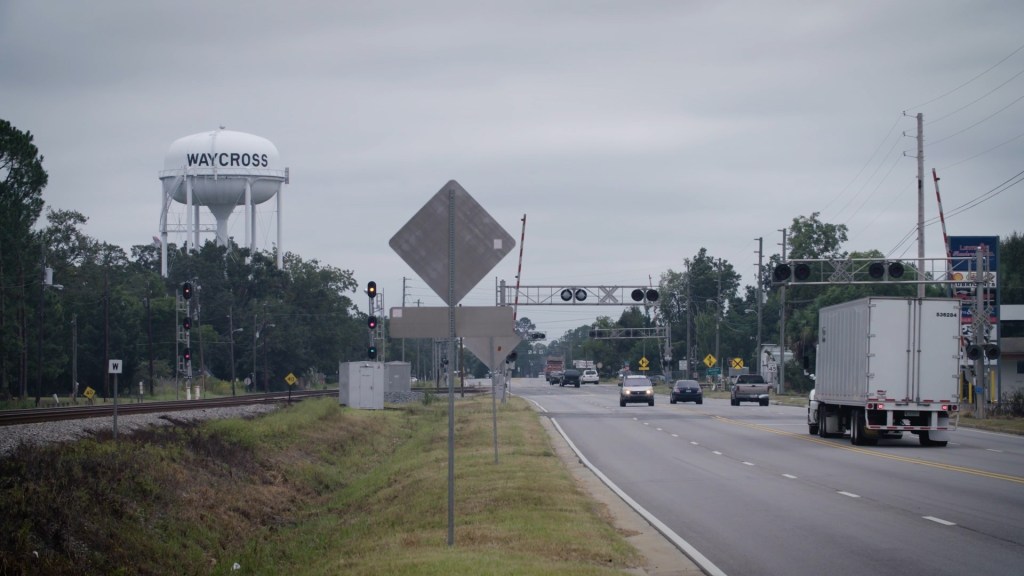Andy Miller is editor and CEO of Georgia Health News. Brenda Goodman is senior news writer for WebMD.
On a recent evening in Waycross, GA, government officials gathered around card tables set up in a semi-circle on the polished wood floors of the city auditorium.
There were representatives from the federal Agency for Toxic Substances and Disease Registry (ATSDR), the Georgia Department of Public Health, the Georgia Environmental Protection Division, the local water department, and the city council. Even the mayor, John Knox, stood to the side, ready to greet people.
Across the street, a police officer stood next to his cruiser, baking in the 90 degree-plus heat.
They were waiting for crowds that never came. Only a handful of people showed up.
The residents? There was apparently little interest – or little trust – in what these officials had to say about a tragic rash of child cancers here, and about whether something in the water, air or soil made them sick.
“What I think the community wants is an answer, and we don’t have that,” said Dr. Patrick O’ Neal, commissioner of the Georgia Department of Public Health. “I think the community has given up.”
The officials were there to discuss the conclusions of a new report by the arm of the Department of Health and Human Services that investigates environmental health threats.
The report on the local CSX Rail Yard, a heavily contaminated site just outside downtown Waycross, was years overdue but offered no new information to grieving parents.
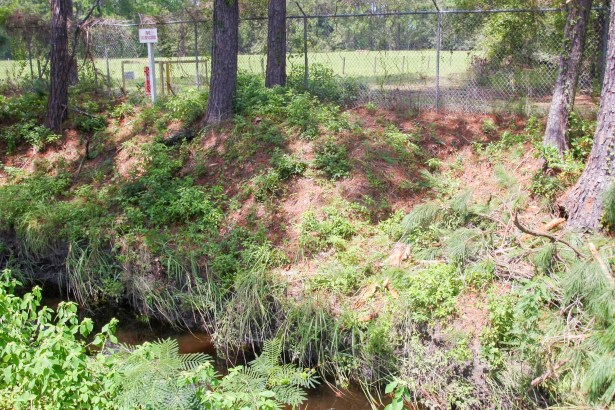
Instead, the report — called a Public Health Assessment — was heavily based on decades of testing ordered by the state but conducted by a contractor paid by CSX.
No new or independent testing was done before the release of the report, despite the fact that in October 2015, Dr. Brenda Fitzgerald, who was then the state’s Public Health commissioner, asked Judson Turner, then the director of the Environmental Protection Division, to do more soil, groundwater and air testing around the CSX site.
Fitzgerald’s request came after a local citizens’ group called Silent Disaster released its own testing that found potentially harmful chemicals the state’s tests were not sensitive enough to detect.
Turner refused to allow more testing, according to Commissioner O’Neal. “We had requested additional testing. EPD felt what they had done was adequate,” he said.
The existence of Public Health’s testing requests came to light after Georgia Health News and WebMD reviewed hundreds of emails obtained through a Georgia Open Records Act Request.
Four cases of cancer in two months
Questions from residents about environmental contamination and childhood cancers have dogged this city of 14,000 in southeast Georgia since four children fell ill with rare sarcoma cancers within two months of each other in 2015. The cancers made local and national headlines. In March 2017, the well-known environmental activist Erin Brockovich announced that she was also looking into the situation. (Here’s our special report on the Waycross situation in 2016.)
Since then, additional children in the area have fallen ill, with brain tumors, an osteosarcoma, and other cancers.
“There seemed to us an abnormal amount of childhood cancer there,” said Dr. McGregor Lott, who was living in Waycross in 2015 when his then 2-year-old son, Harris, was diagnosed with a soft-tissue cancer called rhabdomyosarcoma. The cancer is rare. Only about 350 cases are diagnosed in the U.S. each year.
Harris is lucky, in a way. After enduring months of radiation and chemotherapy, his cancer seems to be gone, though he continues to be monitored for any signs of a recurrence. Gage Walker, who was 5 when he was diagnosed with rhabdomyosarcoma, is also still alive and appears to be cancer-free, though his grandmother, Ellen Walker says he’s not the same kid as he was before he got sick. He’s often ill and suffers from debilitating headaches. His doctors aren’t sure why.
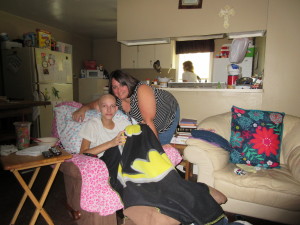
Lexi Crawford, 16, who lived near the CSX facility and suffered from rhabdomyosarcoma, died in May 2017. Raylee Metts, age 6, who had Ewing’s Sarcoma, died in October 2016.
The four children were all diagnosed with these rare cancers over a period of a few months in 2015.
With a family history in Waycross that spans generations, the Lotts in 2017 made the difficult decision to leave. They moved to Jacksonville, FL, partly to be closer to Harris’ cancer doctors, but partly out of concern that there could be environmental contamination in Waycross.
“We felt like if we stayed, and future testing showed there was a problem, we’d be kicking ourselves,” Lott said.
Still, the Lotts have been reluctant to speak out. They did not want to panic people. They care deeply about the town and their friends and neighbors who are still there.
They are both physicians. He’s an ophthalmologist. His wife, Mary Elizabeth, is a pediatrician.
Mary Elizabeth wants people to understand that they made the decision to leave Waycross not as medical experts, but “because we are the parents.”
“There’s a fundamental challenge. We don’t know what causes these cancers,” she said. “I think something was released into the environment,” but she understands that they may never find out what it was.
“When your child gets sick, your response is, ‘Why?’ We need a rational reason,” she said. “Unfortunately, I don’t think all these families will get an answer.”

The new Agency for Toxic Substances and Disease Registry report concluded it was unlikely that chemicals spilled into the water and soil of the Waycross Canal had made anyone sick. But experts couldn’t rule out an airborne threat. Scientists said they could not tell whether chemical contamination in indoor or outdoor air around the site had or would cause illness because no air monitoring had ever been done at the site or in nearby homes.
Joan Tibor leads the group Silent Disaster, which asked ATSDR to conduct the assessment. She said she was very disappointed in the results.
“It’s bunk. It’s just a regurgitation of CSX documents. What we were hoping for is for them to address the deficits in the CSX documents. We knew there was no air testing,’’ she said.
Tibor called the public meeting “a waste of time.”
In a statement emailed to WebMD, CSX said, “We are pleased the Georgia Department of Public Health found no evidence linking the operations at Rice Yard to health concerns raised by members of the public.”
The company also said it is reviewing all of the recommendations in the health assessment and will submit official comments for the public record.
ATSDR is taking public comments on the report until July 23.
The public health assessment comes as a recent spate of lawsuits has been filed against CSX — at least 40 since 2017— from current and former workers saying that exposure to toxic chemicals on the job gave them cancer. Some of the plaintiffs worked at the Waycross site.
Contaminated property
Frank Sanchez, director of the chemical hazards program at the Georgia Department of Public Health and author of the new report, told reporters the CSX railyard property was the most contaminated he had ever seen.
Asked if ATSDR could seek more testing around a contaminated site, Leann Bing, the Region 4 Representative for the agency, said, “We can recommend more testing, but there needs to be a reason.”
Bing said the agency does consider the quality of the data they’re asked to review. If they find problems, they can reject it.
Cristy Rice, Lexi’s mom, said she was frustrated by the report. “It’s the same stuff they’ve been trying to push on us. There was no new testing,” she said.
“If they don’t have anything to hide, why not do the correct testing?” she asked. “Why not take the information that the citizens came up with on their own” and test it?
“I’m searching for answers. I’ve lost a child,” she said.
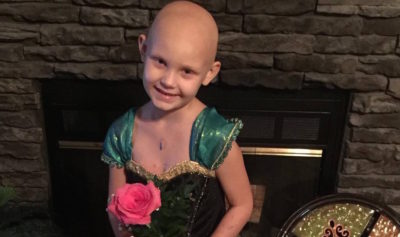
Haylee Metts, Raylee’s mother, said she didn’t go to the meeting because she, too, is frustrated by the government’s lack of response. “I feel like they have staged all responses, and they aren’t open to listening to anything these families have to say,” she said.
“It seems like they have made up their minds and instead of doing further digging, they are just shutting it off,” Metts said.
The Department of Public Health has asked the EPD to do air quality modeling of pollutants coming from the CSX site, according to Sanchez, the Chemical Hazards Program director at DPH.
That modeling would be an estimate of airborne contaminants coming off the site based on measurements taken at other railyards around the U.S. It would not rely on direct, independent measurements of pollutants at the Waycross CSX site. Doing those measurements would cost “millions and millions of dollars,” Sanchez said.
The nearest air quality monitor is 29 miles north of the city. It samples the air for particulates only once every 6 days. It samples for toxic chemicals once every 12 days. The monitor sits in the middle of a state park.
Asked whether investigators had contacted any of the families of children with cancer in Waycross, O’Neal said that Georgia’s cancer registry had been in communication with cancer registries from other states, and that he thought epidemiologists from his agency had spoken with parents.
The Waycross families dispute that, though. None say they have ever been contacted by state or federal officials to ask them about their children’s cancers.
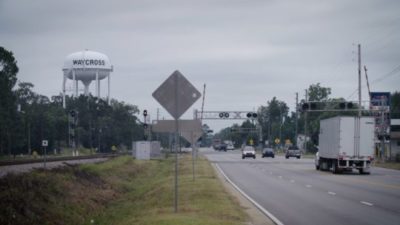
The way the Waycross investigation has been handled stands in contrast to efforts made by other states on behalf of families concerned about environmental links to cancer.
In 2016, public health officials in New Hampshire declared that they had a cluster of rhabdomyosarcoma cases in the town of Rye and nearby communities. In that coastal New England area, where there were ‘’fewer than five’’ cases of rhabdomyosarcoma identified over a 10-year period, officials sent a 15-page questionnaire to affected families to try to determine whether the children had any common environmental exposures. That’s never been done for the Waycross families.
City officials say that because the various agencies didn’t find any link between contamination and the child cancers, it’s unfair to accuse Waycross of covering up information. “It’s cancer doing what cancer does,’’ said Mayor Knox, adding that he himself has had eight cancer surgeries.
“I’ve had cancer, but I don’t blame anyone for that,” Knox said.

O’Neal of Public Health said childhood cancer “is horrific under any circumstances. I really sympathize with what [the families] have gone through.’’
“What the community wants is an answer,’’ he added. “I don’t think there is an answer. It’s an extraordinarily sad situation.”
Almost three years ago, in December 2015, the federal ATSDR accepted a petition from Silent Disaster to evaluate the hazard to residents posed by two sites known to be contaminated by toxic chemicals —the sprawling railroad switching and maintenance yard operated by CSX, and the site of a former Atlanta Gas Light Manufactured Gas Plant, which once turned coal into gas for cooking, heating, and light — a toxic process.
In Sept. 2016 letter to state Rep. Jason Spencer, a Republican from Woodbine, ATSDR said its report on CSX had been completed and would be released by the end of that year. Later, in emails to activists, the agency again pushed the release date to spring 2017.
Given that report contains only historical data, ATSDR was asked why the report took so long to produce, and why it was released nearly two years after they promised it. In a statement, the agency said the investigations must be done with “scientific rigor and oversight.”
“The process can be time-consuming but is critical to ensure the accuracy of our analysis,” the statement said.
Sources:
Patrick O’Neal, MD, commissioner, Georgia Department of Public Health, Atlanta, GA.
McGregor Lott, MD, ophthalmologist, father of Harris, Jacksonville, FL.
Mary Elizabeth Lott, MD, pediatrician, mother of Harris, Jacksonville, FL.
Joan Tibor, citizen activist, Jacksonville, FL.
Frank Sanchez, director, chemical hazards program at the Georgia Department of Public Health, Atlanta, GA.
Leann Bing, the Region 4 Representative, Agency for Toxic Substances and Disease Registry, Atlanta, GA.
Cristy Rice, mother of Lexi Crawford, Waycross, GA.
Haylee Metts, mother of Raylee Metts, Waycross, GA.
Ellen Walker, grandmother of Gage Walker, Hoboken, GA.
ATSDR, CSX Rail Yard Public Health Assessment, June 7, 2018
CSX Media Relations, Public Statement, July 2, 2018
Shirley Herrin vs. CSX, filed in Duval County (FL) Court, May 24, 2018

